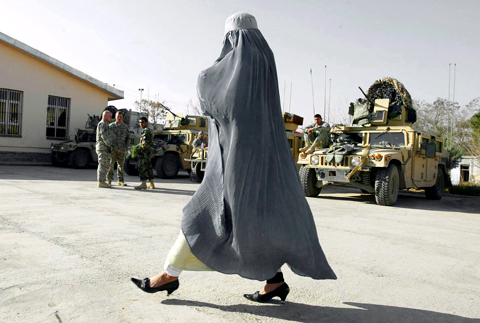Malaysia strongly condemned weekend attacks on nine Christian churches and sought to assure foreign governments yesterday of its commitment to religious freedom for minorities.
The attacks have strained ties between Christians and Malay Muslims, denting Malaysia’s image as a moderate Muslim-majority country and raising questions about its political stability.
The attacks, which started on Friday, were apparently triggered by a Dec. 31 High Court decision that overturned a government ban on Roman Catholics’ using “Allah” to refer to their God in the Malay-language edition of their main newspaper, the Herald.

PHOTO: EPA
The ruling also applies to the ban’s broader applications such as Malay-language Bibles, 10,000 copies of which were recently seized by authorities because they translated God as Allah. The government has appealed the verdict.
The Home Ministry held a one-hour briefing yesterday for about 70 foreign diplomats to assure them that the situation was under control. The ministry pledged to “protect the sanctity” of the diversity of the country’s religions and said police would step up patrols at churches and mosques.
The ministry said the attacks were perpetrated by extremists who wanted to weaken the country’s racial harmony.
“These were not just attacks on houses of worship, they were attacks on the values and freedoms all Malaysians share,” the statement said.
About 9 percent of Malaysia’s 28 million people are Christian, most of whom are ethnic Chinese or Indian. Muslims make up 60 percent of the population and most are ethnic Malays.
The attacks are also a blow to racial unity espoused by Malaysian Prime Minister Najib Razak under his “1Malaysia” slogan since taking power in April, and pose a new challenge for him as he seeks to strengthen his ruling coalition after its losses in 2008 general elections.
“It showed that, after 52 years of living together, nation building and national unity is in tatters,” said Charles Santiago, an opposition member of parliament. “The church attacks shattered notions of Malaysia as a model secular Muslim nation in the eyes of the international community.
The latest attack early yesterday left the main entrance of the Borneo Evangelical Church in southern Negeri Sembilan state charred, the Reverend Eddy Marson Yasir said. He said it was unclear how the wooden door was burned, but there was no evidence that a firebomb had been used.
Firebombs have been thrown at seven other churches nationwide since Friday, with another splashed with black paint. No one was hurt and the churches suffered little damage, except the Metro Tabernacle Church in a Kuala Lumpur suburb, which had its office on the first floor gutted by fire.
Some 130 Muslim voluntary groups have offered to help protect the churches by becoming the “eyes and ears” of the police, said Nadzim Johan, a representative of the groups.
The Allah ban is unusual in the Muslim world. The Arabic word is commonly used by Christians to describe God in such countries as Egypt, Syria and Indonesia.

When Shanghai-based designer Guo Qingshan posted a vacation photo on Valentine’s Day and captioned it “Puppy Mountain,” it became a sensation in China and even created a tourist destination. Guo had gone on a hike while visiting his hometown of Yichang in central China’s Hubei Province late last month. When reviewing the photographs, he saw something he had not noticed before: A mountain shaped like a dog’s head rested on the ground next to the Yangtze River, its snout perched at the water’s edge. “It was so magical and cute. I was so excited and happy when I discovered it,” Guo said.

Chinese authorities said they began live-fire exercises in the Gulf of Tonkin on Monday, only days after Vietnam announced a new line marking what it considers its territory in the body of water between the nations. The Chinese Maritime Safety Administration said the exercises would be focused on the Beibu Gulf area, closer to the Chinese side of the Gulf of Tonkin, and would run until tomorrow evening. It gave no further details, but the drills follow an announcement last week by Vietnam establishing a baseline used to calculate the width of its territorial waters in the Gulf of Tonkin. State-run Vietnam News

TURNAROUND: The Liberal Party had trailed the Conservatives by a wide margin, but that was before Trump threatened to make Canada the US’ 51st state Canada’s ruling Liberals, who a few weeks ago looked certain to lose an election this year, are mounting a major comeback amid the threat of US tariffs and are tied with their rival Conservatives, according to three new polls. An Ipsos survey released late on Tuesday showed that the left-leaning Liberals have 38 percent public support and the official opposition center-right Conservatives have 36 percent. The Liberals have overturned a 26-point deficit in six weeks, and run advertisements comparing the Conservative leader to Trump. The Conservative strategy had long been to attack unpopular Canadian Prime Minister Justin Trudeau, but last month he

Four decades after they were forced apart, US-raised Adamary Garcia and her birth mother on Saturday fell into each other’s arms at the airport in Santiago, Chile. Without speaking, they embraced tearfully: A rare reunification for one the thousands of Chileans taken from their mothers as babies and given up for adoption abroad. “The worst is over,” Edita Bizama, 64, said as she beheld her daughter for the first time since her birth 41 years ago. Garcia had flown to Santiago with four other women born in Chile and adopted in the US. Reports have estimated there were 20,000 such cases from 1950 to